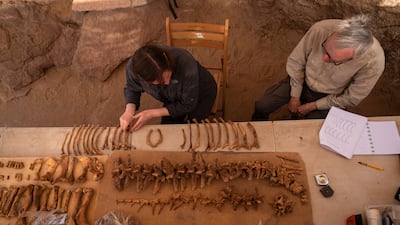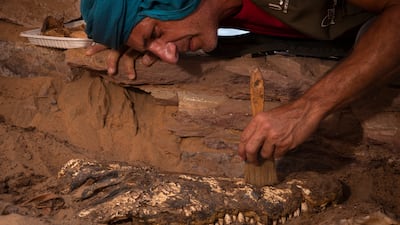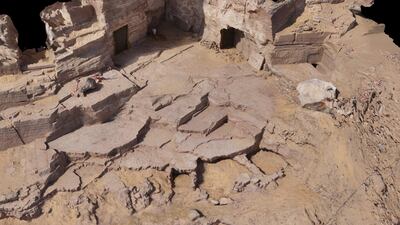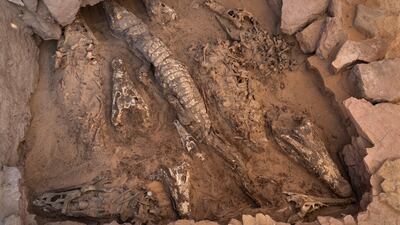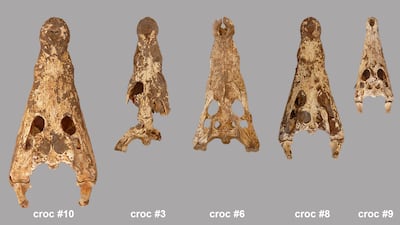Ten mummified crocodiles unearthed in southern Egypt are different from other mummified animal remains, experts have said.
Five mostly complete adult crocodiles and five skulls were found beneath a Byzantine rubbish dump at the Qubbat Al Hawa site on the bank of the Nile opposite Aswan in 2019.
A study published in an American scientific journal on Wednesday said the remains were likely to have been placed there by worshippers of the Egyptian god Sobek.
The mummified crocodiles are unique in the minimal preparation they underwent before burial, study co-author Dr Bea De Cupere told The National.
“There was no evidence of any special preparation technique of the mummies, she said.
“There are no indications that the intestines were removed and there is no trace of the use of bitumen.” Bitumen is a balm often used for mummification.
Dr De Cupere said one of the most interesting aspects of the discovery was the varying states of preservation.
While some of the remains were just skulls, others were well-preserved full bodies.

The remains were not covered with resin before burial — a common mummification practice that developed during Ptolemaic Egypt (305-30 BC). This has led Dr De Cupere and her colleagues to believe the crocodiles were buried before the Ptolemaic period, making them at least 2,300 years old.
She told The National her team could not be sure until they conduct carbon dating on the specimens, which she hopes to happen soon.
The remains, which comprised two different species of crocodile, were most likely killed elsewhere and then either laid out on a surface or buried in sand to dry out, Dr De Cupere said.
They were then wrapped in linen and mats of palm leaves and brought to the tomb where they were buried.
Over the years the linen disintegrated, meaning the team was able to study the crocodiles at the excavation site without needing scans to see past bandages, as can be the case with other finds of this kind.
Crocodiles held special prominence in ancient Egyptian culture. Aside from being considered the earthly manifestation of Sobek, whose cult often buried its dignitaries with mummified crocodiles, they were also feared.

It is likely that the crocodiles found in 2019 were placed there by worshippers of Sobek, Dr De Cupere’s team said in the study.
The unearthed remains were also of adult crocodiles. Of 300 or so crocodile mummies, about 80 per cent are from juvenile, often fairly recently hatched, specimens, said the study, published in PLOS One journal
Ten per cent are complete, larger specimens from 50cm to 350cm long and the remaining 10 per cent are heads, skulls or lower jaws, it said.
The animals varied in length between 1.8 metres and 3.5 metres and included both Nile and West African crocodiles, Dr De Cupere said.
The Nile crocodile is still found in Egypt’s southernmost regions, but the West African crocodile is no longer in the country.
One of the largest specimens measured more than 2.1 metres in length and was almost entirely intact, having suffered only minor decomposition of some of its extremities.
Dr De Cupere hopes to conduct DNA tests on the specimens to be sure of their species.


